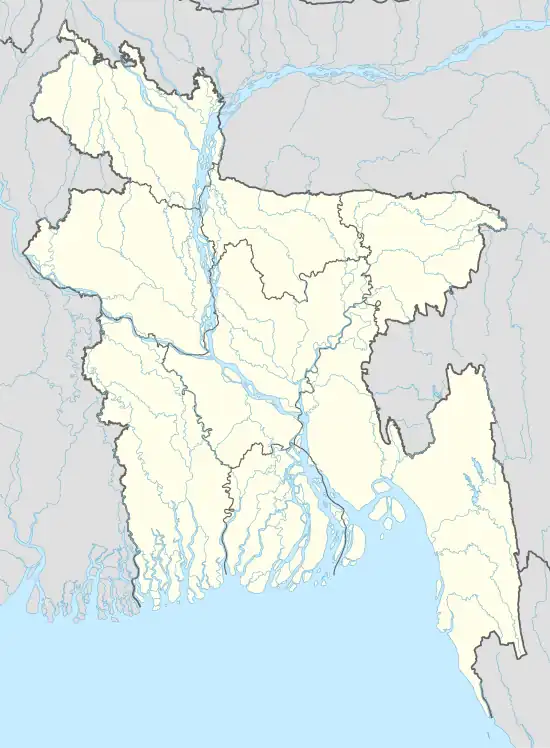Santahar Junction সান্তাহার জংশন | |
|---|---|
| Bangladesh Railway Junction Station | |
 | |
| General information | |
| Location | Santahar, Bogra District Bangladesh |
| Coordinates | 24°48′26″N 88°59′10″E / 24.8071°N 88.9861°E |
| Owned by | Bangladesh Railway |
| Line(s) | Chilahati-Parbatipur-Santahar-Darshana Line Santahar-Kaunia Line |
| History | |
| Opened | 1878 |
| Location | |
 Santahar Location in Bangladesh | |
Santahar (Bengali: সান্তাহার) is a railway junction in Adamdighi Upazila in Bogra District of Rajshahi Division in Bangladesh.
History
From 1878, the railway route from Kolkata, then called Calcutta, to Siliguri was in two laps. The first lap was a 185 km journey along the Eastern Bengal State Railway from Calcutta Station (later renamed Sealdah) to Damookdeah Ghat on the southern bank of the Padma River, then across the river in a ferry and the second lap of the journey. A 336 km (209 mi) metre gauge line of the North Bengal Railway linked Saraghat on the northern bank of the Padma to Siliguri.[1] It was during this period that Santahar came up as a railway station.
In 1899-1900 a metre gauge railway line was constructed between Santahar and Fulchhari, on the western bank of the Jamuna by Brahmaputra-Sultanpur Railway Company.[2]
The Kolkata-Siliguri main line was converted to broad gauge in stages. The Shakole-Santahar section was converted in 1910–1914, when Hardinge Bridge was under construction. The Hardinge Bridge was opened in 1915 and the Santahar-Parbatipur section was converted in 1924.[2]
In 1971, during the Bangladesh Liberation War, 15000 Biharis in the adjoining town of Santahar were massacred by members of the Mukti Bahini.[3][4]
See also
References
- ↑ "India: the complex history of the junctions at Siliguri and New Jalpaiguri". IRFCA. Retrieved 2011-12-26.
- 1 2 "Brief History". Bangladesh Railway. Archived from the original on 2011-12-20. Retrieved 2011-12-26.
- ↑ "Fall of Dhaka: How Mukti Bahini 'cleansed' Santahar town of non-Bengalis". The Express Tribune. 2017-12-15. Retrieved 2022-02-27.
- ↑ Mukul, M.R. Akhtar. Ami Bijoy Dekhechi’ (I have seen victory). Dhaka.
External links